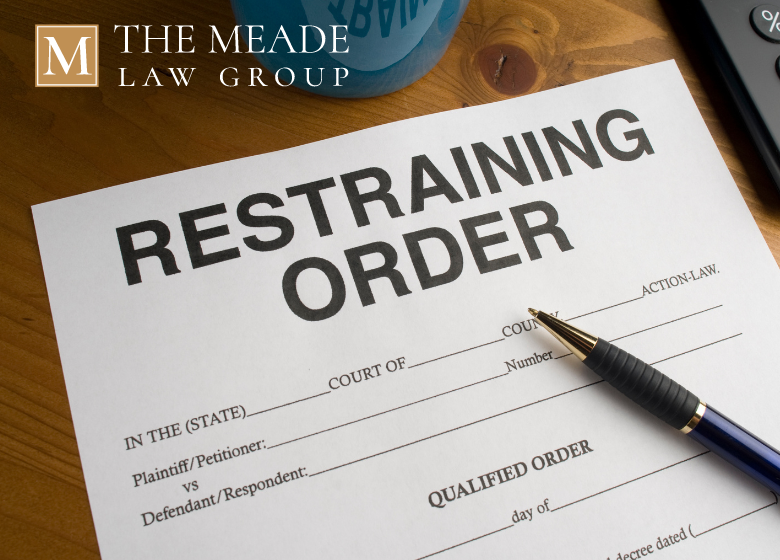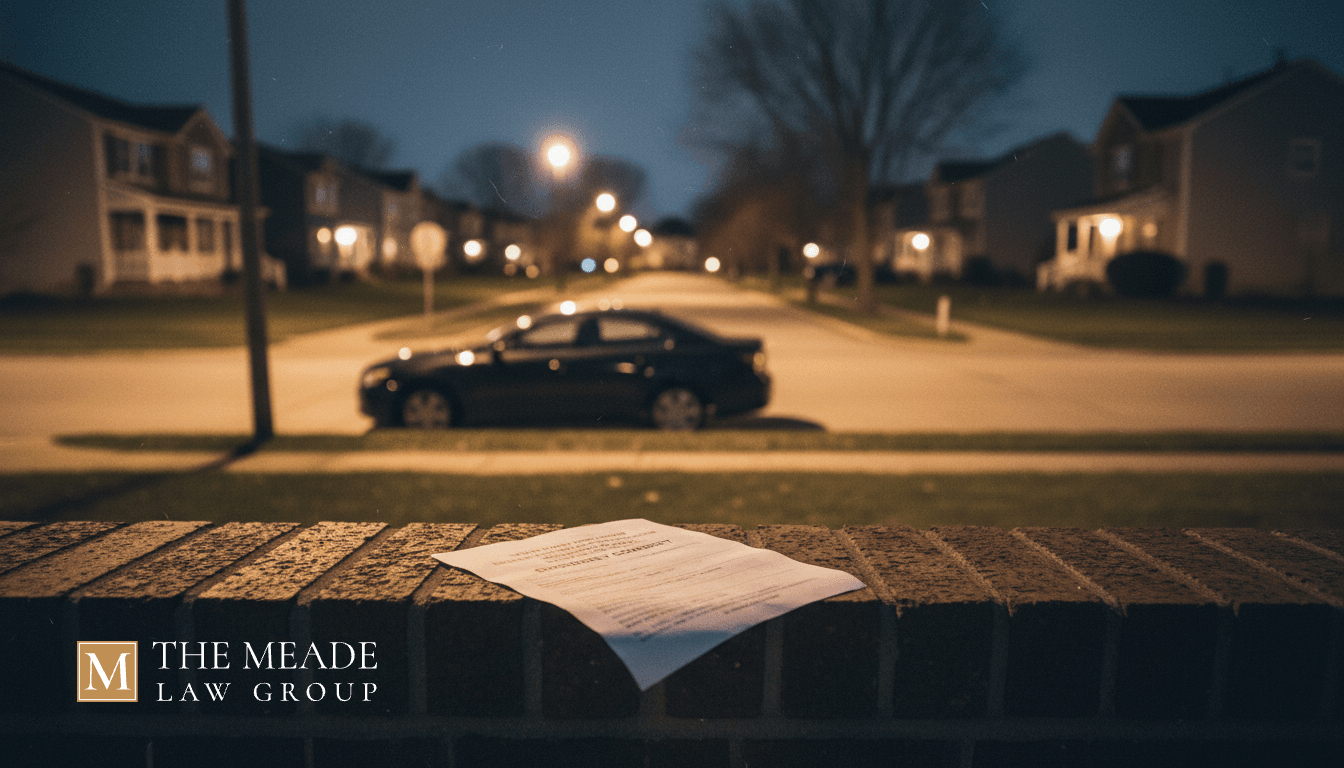If you are reading this, you are likely in a crisis. Whether you are a victim seeking immediate safety from domestic violence or a defendant facing a restraining order that could strip you of your home, children, and firearm rights, the stakes are incredibly high.
Ohio law regarding protection orders is complex and strictly enforced. A misunderstanding of the difference between a Temporary Protection Order (TPO) and a Civil Protection Order (CPO) can lead to accidental criminal records, lost custody, or unprotected victims.
At The Meade Law Group, we believe that clarity is the first step toward legal safety. This comprehensive guide breaks down the Ohio Revised Code (ORC) statutes governing protection orders, the chronological process of obtaining or defending against one, and the severe consequences of violations.
Types of Protection Orders in Ohio: Legal Comparison
Ohio utilizes a “patchwork” of protection orders depending on the relationship between the parties and whether criminal charges have been filed. Use this table to identify which order applies to your situation.
Type of Order | Who Can File / Who It Protects | Legal Basis (ORC) | Duration | Issued In | Criminal Consequences |
Domestic Violence Temporary Protection Order (DVTPO) | Victim of domestic violence, where criminal charges are filed. | ORC § 2919.26 | Ends when the criminal case ends (plea, dismissal, or conviction). | Criminal Court (Municipal or Common Pleas) | Yes (1st Degree Misdemeanor or Felony) |
Domestic Violence Civil Protection Order (DVCPO) | Family or household members (spouse, parent, co-parent, cohabitant). | ORC § 3113.31 | Up to 5 Years. | Domestic Relations Court | Yes (Arrest + Contempt of Court) |
Civil Stalking Protection Order (CSPO) | Victims of “Menacing by Stalking” (strangers, neighbors, coworkers). | ORC § 2903.214 | Up to 5 Years. | Common Pleas Court (General Div.) | Yes (Arrest + Contempt of Court) |
Criminal Protection Order (CRPO) | Victims of non-domestic crimes (assault, stalking, menacing). | ORC § 2903.213 | Ends when the criminal case ends. | Criminal Court | Yes (1st Degree Misdemeanor or Felony) |
The “Alphabet Soup” of Ohio Protection Orders
The most common question we receive as a Columbus, Ohio protection order lawyer is: “What is the difference between a TPO and a CPO?”
While they both order a person to “stay away,” their origins and powers are vastly different.
Temporary Protection Order (TPO) – ORC § 2919.26
A Temporary Protection Order in Ohio is exclusively a creature of criminal law. It only exists if someone has been arrested and charged with a crime, usually Domestic Violence, Assault, or Menacing.
- Trigger: The police arrest the defendant. At the arraignment (usually within 24 hours), the victim (or prosecutor) requests a TPO.
- Limitation: A TPO is tied to the criminal case. If the charges are dropped, or the defendant pleads guilty and is sentenced, the TPO expires. It is a “band-aid” meant to protect the victim while the criminal case works through the system.
- Scope: It usually only covers “stay away” and “no contact.” It rarely deals with complex issues like child support or dividing household assets.
Civil Protection Order (CPO) – ORC § 3113.31
A Civil Protection Order in Ohio is the most powerful tool in domestic violence law. It is a civil lawsuit filed in the Domestic Relations Court.
- Independence: You do not need an arrest or criminal charge to get a CPO. You simply need to prove by a “preponderance of the evidence” that domestic violence occurred.
- Power: A CPO can evict a defendant from their own home, grant temporary child custody, order child support, and award exclusive use of vehicles.
- Duration: Unlike the TPO, a CPO lasts up to 5 years, regardless of what happens in criminal court.
Civil Stalking Protection Order (CSPO) – ORC § 2903.214
What if the harasser is not a family member? If a neighbor, coworker, or former casual date is harassing you, you cannot file for a domestic violence CPO. Instead, you file for a Stalking Protection Order in Ohio.
- Requirement: You must prove “Menacing by Stalking” a pattern of conduct (two or more incidents) that causes you to believe the offender will cause physical harm or mental distress.
The Chronological Process: From Filing to Final Judgment
Whether you are the Petitioner (victim) or the Respondent (accused), understanding the timeline is critical. The process moves fast, often catching Respondents off guard.
Step 1: The Ex Parte Hearing (Emergency)
In Ohio, a victim can walk into court and get an order the same day without the accused present. This is called an ex parte protection order in Ohio.
- The Petitioner testifies before a magistrate about the violence or threats.
- The Respondent is not notified and is not present.
- The Result: If the magistrate finds “immediate and present danger,” they issue an Ex Parte Order. This order is effective immediately upon service.
- Warning for Respondents: You may come home to find a Sheriff’s Deputy serving you papers and ordering you to leave your house in 15 minutes. This is legal. Do not argue with the officer.
Step 2: Service of Process
The order is not enforceable against the Respondent until they have been “served” (officially handed the papers). However, once served, the restrictions are absolute. Violating an Ex Parte order carries the same criminal penalties as violating a final order.
Step 3: The Full Hearing (Within 7-10 Days)
Ohio law requires a “Full Hearing” to be set quickly, usually within 7 or 10 days of the Ex Parte order.
- Evidence: This is a mini-trial. Both sides can call witnesses, present text messages, show photos of injuries, and cross-examine each other.
- Burden of Proof: The Petitioner must prove their case by a “preponderance of the evidence” (more likely than not). This is a lower standard than “beyond a reasonable doubt.”
- The Decision: The judge will either dismiss the petition or issue a Final CPO valid for up to 5 years.
What a Protection Order Actually Does (Consequences)
A protection order is not just a piece of paper; it is a strict liability restraint on your civil liberties.
Total Separation & Electronic Silence
“No Contact” means zero.
- No texting, emailing, or social media DMs.
- No asking a friend to “tell her I’m sorry.” (This is “Third Party Contact” and is a crime).
- No liking their posts on Facebook.
- No showing up at their workplace, even if you are a customer there.
Impact of Protection Orders on Gun Rights in Ohio
This is a critical area often overlooked. Under federal law (18 U.S.C. § 922(g)(8)), if you are subject to a CPO that was issued after a hearing where you had notice, you are federally prohibited from possessing firearms or ammunition.
- Upon issuance of the CPO, you must often surrender all firearms to law enforcement immediately.
- Possessing a single bullet while under a CPO is a federal felony punishable by up to 10 years in prison.
Housing and Custody
A CPO can grant the petitioner “exclusive possession” of the shared residence. The Respondent is effectively evicted and may still be liable for the mortgage/rent. Furthermore, the court can suspend the Respondent’s visitation rights with their children entirely if it deems the Respondent a danger.
Violation of Protection Order, Ohio: The “Strict Liability” Trap
Ohio takes a “strict liability” approach to violation of protection orders in Ohio cases. This means your intent often does not matter; only your actions do.
The “Invitation” Myth
This is the #1 Common Mistake that leads to arrests.
- Scenario: The victim gets a CPO against her ex-husband. Two weeks later, she feels bad and texts him: “I miss you, come over for dinner.” He goes over.
- Result: He goes to jail.
CRITICAL RULE: The Protected Person (victim) cannot permit you to violate the order. Only a Judge can modify the order. If the victim invites you over, and the neighbors call the police, you will be arrested, not them. The victim has no legal authority to lift the order; only the Court does.
Protection Order Violations and Penalties in Ohio
Violating a protection order (ORC § 2919.27) escalates quickly from a misdemeanor to high-level felonies.
Violation Type | Criminal Charge | Misdemeanor/Felony | Possible Jail Time | Collateral Consequences |
First Violation | Violating Protection Order | 1st Degree Misdemeanor | Up to 180 Days | Permanent criminal record; Probation; firearm ban. |
Second Violation | Violating Protection Order | 5th Degree Felony | 6-12 Months Prison | Felony conviction; Loss of voting rights; Permanent firearm disability. |
Violation While Committing a Felony | Violating Protection Order | 3rd Degree Felony | 9-36 Months Prison | Mandatory prison time often applies if violence occurred. |
Electronic Monitoring Tampering | Escape / Vandalism | Felony | 1-5 Years Prison | Additional charges for cutting off GPS ankle monitors. |
Defending Against or Modifying a Protection Order in Ohio
If you are served with an Ex Parte order, you have the right to fight it. Do not accept a 5-year CPO just to “get it over with.” A CPO appears on background checks and can bar you from employment in healthcare, education, and security.
Defense Strategies at the Full Hearing
- Lack of Evidence: Disproving the allegation of “imminent fear.” If the “threats” were vague or mutual arguments, they may not meet the legal standard for domestic violence.
- Credibility: Using cross-examination to expose inconsistencies in the accuser’s story.
- Consent Agreements: In some cases, we can negotiate a “Consent Agreement” CPO without an admission of guilt. This is a civil settlement that may have fewer restrictions than a judge-issued order (e.g., preserving some visitation rights).
Modifying or Dismissing an Existing Order
If a CPO is already in place, it is difficult but not impossible to remove.
- Motion to Modify/Terminate: You must file a formal motion showing a “change in circumstances.”
- Examples: The parties have attended counseling, the petitioner no longer fears the respondent, or significant time has passed without incident.
- Note: The Petitioner’s consent to remove the order carries heavy weight, but the Judge still has the final say.
Common Mistakes That Lead to Violations
- “Just one text”: Sending a text saying “When can I see the kids?” is a violation if the order says “No Contact.”
- Using Third Parties: Asking your mother to call your ex-wife is a violation.
- Social Media Tagging: Tagging the protected person in a post or posting photos of them can be considered “menacing by stalking” or a violation of the “mental distress” clause.
- Meeting for Exchange: If the order says “curbside exchange of children,” do not get out of the car. Do not enter the house. Stick exactly to the script.
Contact The Meade Law Group
If you or a loved one is seeking or defending against a protection order in Ohio, the window to prepare for the full hearing is extremely short.
Ex parte orders are issued instantly, court dates are set within days, and the consequences of a permanent order can last for years. You cannot afford to walk into court unprepared.
Meade Law Group provides strategic legal representation for both petitioners and respondents. We understand the high stakes of domestic litigation; we defend your rights and reputation.
Whether cross-examining false allegations at a full hearing or negotiating a Consent Agreement to avoid a criminal record, our goal is to protect your safety and your civil liberties.
Don’t wait until a five-year order is issued against you.
Contact Meade Law Group today for a confidential case review. Let us fight to secure your future.
Frequently Asked Questions (FAQ)
Question | Answers |
What is the difference between a TPO and a CPO? | A TPO is a temporary order issued during a criminal case (like domestic violence) and ends when the case ends. A CPO is a civil order issued by a Domestic Relations court that can last up to 5 years regardless of criminal charges. |
Does a protection order go on my criminal record? | A Civil Protection Order (CPO) is a civil record, but it will show up on background checks. A violation of the order creates a criminal record. A TPO is part of a criminal case file. |
Can I own a gun if I have a CPO against me? | Generally, no. Under federal law 18 U.S.C. 922(g)(8), you are prohibited from possessing firearms if you are subject to a CPO issued after a hearing where you had notice. You must surrender them. |
What happens if the victim invites me over? | Do not go. The victim cannot legally authorize you to violate the court order. If police find you there, you will be arrested for violating the order, even if the victim says you were invited. |
Can a protection order affect my job? | Yes. It is a public record. Employers in banking, healthcare, education, and government often terminate employees with active protection orders due to liability concerns. |
How much does it cost to file a CPO? | There is no filing fee for a victim to file a petition for a Domestic Violence CPO or Stalking Protection Order in Ohio. |
Do I need a lawyer for a CPO hearing? | Highly recommended. The rules of evidence apply. A lawyer can cross-examine witnesses, object to hearsay, and ensure your rights are protected. Losing a CPO hearing has 5-year consequences. |
Can a CPO generally determine child custody? | Yes, temporarily. A CPO can award temporary custody to the petitioner and suspend the respondent’s visitation rights until a formal divorce or juvenile court custody case is established. |
What is “Ex Parte”? | “Ex Parte” means “one side only.” It is an emergency hearing where the judge hears only the victim’s side to issue an immediate temporary order before the full trial. |
Can I get a protection order against a neighbor? | Yes, but not a Domestic Violence CPO. You would file for a Civil Stalking Protection Order (CSPO) and must prove a “pattern of conduct” that causes mental distress. |
What if I live in Franklin County, but the incident happened elsewhere? | You can generally file in the county where you reside, where the incident occurred, or where the respondent resides. |
Can a protection order be dropped? | Only by a judge. The petitioner can file a motion to dismiss, but the judge must sign off on it. It does not disappear automatically just because the victim wants it to. |


